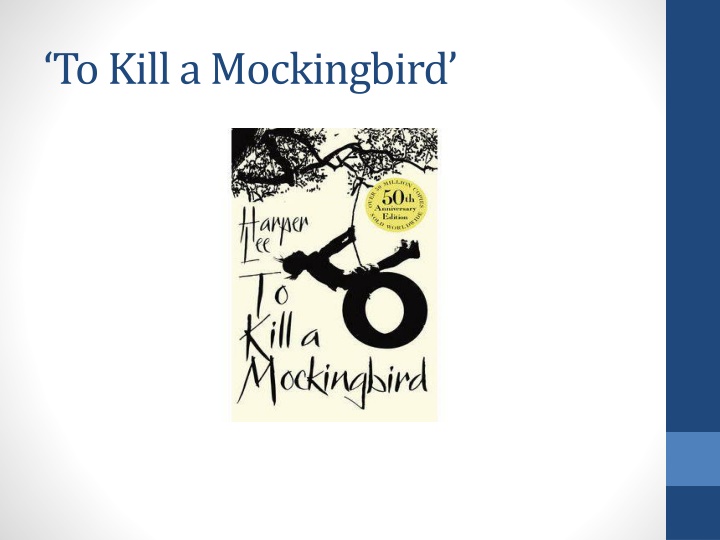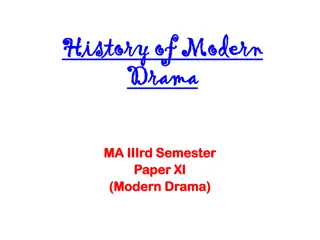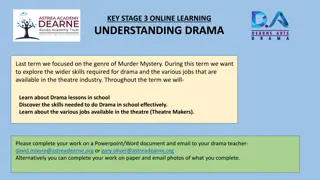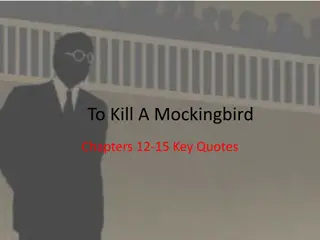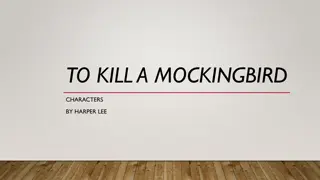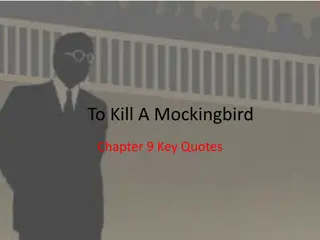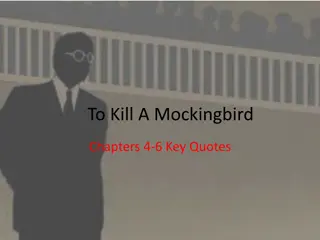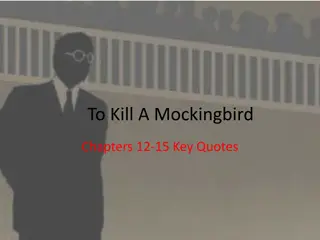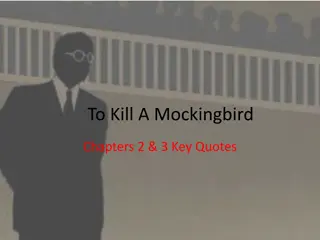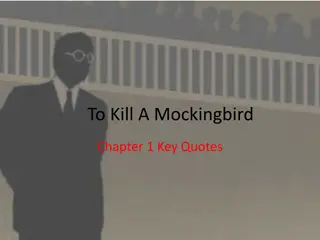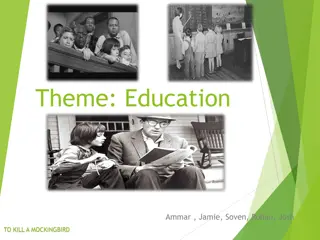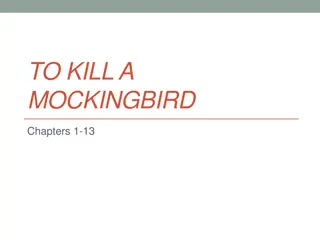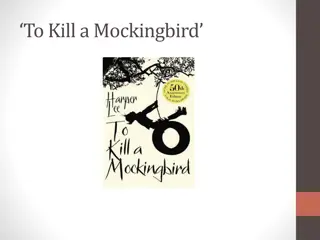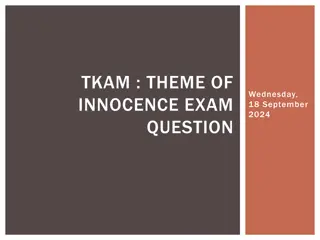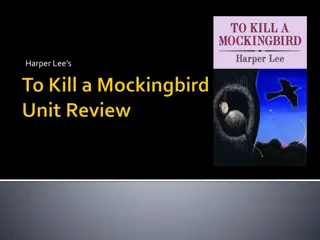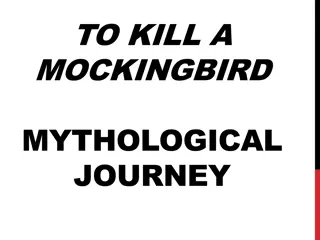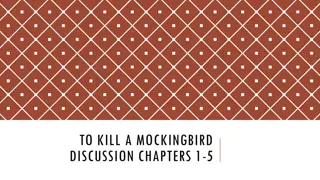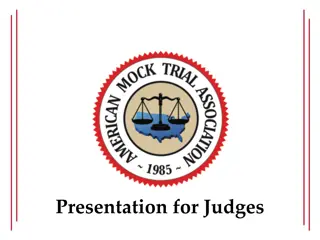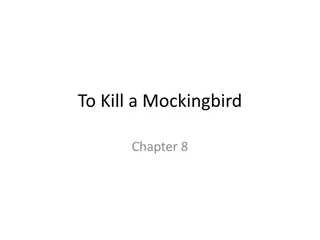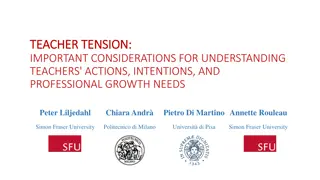Trial Drama and Racial Tensions in "To Kill a Mockingbird
Tom Robinson's trial in "To Kill a Mockingbird" reveals deep-seated racial prejudice as Atticus defends him against false accusations. Despite compelling evidence, the jury's prejudice leads to an unjust verdict, highlighting the systemic injustices in Maycomb. Atticus' unwavering integrity and the harsh reality of racial discrimination are central themes in this gripping tale.
Download Presentation

Please find below an Image/Link to download the presentation.
The content on the website is provided AS IS for your information and personal use only. It may not be sold, licensed, or shared on other websites without obtaining consent from the author.If you encounter any issues during the download, it is possible that the publisher has removed the file from their server.
You are allowed to download the files provided on this website for personal or commercial use, subject to the condition that they are used lawfully. All files are the property of their respective owners.
The content on the website is provided AS IS for your information and personal use only. It may not be sold, licensed, or shared on other websites without obtaining consent from the author.
E N D
Presentation Transcript
Chapter Sixteen to Twenty-One Plot Summary Tom Robinson s trial begins and it seems as if the whole town is in attendance. Whites sit downstairs, whilst blacks are only allowed to sit in the upstairs balcony. This is where Scout, Jem and Dill go to sit with Reverend Sykes. Atticus questions Heck Tate and finds holes in his testimony that cast doubt over Tom s guilt. Atticus then questions Bob Ewell and Jem believes he is pointing to the fact it was really Ewell who beat up his daughter for wanting to be with a black man.
Chapter Sixteen to Twenty-One Plot Summary Mayella is next to take the stand and Atticus destroys her testimony. We discover that Tom could not have caused her injuries as he has a withered left arm. Mayella takes the huff, after Atticus asks her if her father beat her up, and tries to run out of the court screaming that she should be believed. Tom Robinson takes the stand next. He explains that Mayella kept asking him to help her out.
Chapter Sixteen to Twenty-One Plot Summary Tom makes the mistake of saying he felt sorry for Mayella, something the white lawyer, Mr Gilmore, and the whites in the courtroom will not accept. Tom tells the truth about how the lonely Mayella wanted a man and thought it may as well be him. Tom says Bob Ewell saw her trying to kiss him and he ran off Tom collapses into tears as he says this.
Chapter Sixteen to Twenty-One Plot Summary After the children meet Dolphus Raymond, a man rejected for marrying a black woman, and find him interesting, they go back into the courthouse for Atticus final statement. The jury stays out until midnight to reach their verdict. Despite a brilliant speech and searing testimony, Tom is still found guilty by the prejudiced jury.
Character Atticus Finch - The black community of Maycomb know that Atticus Finch has done a brilliant job of defending Tom, and that he has shown how corrupt and immoral the justice system is. - They hope that Tom can be found innocent on appeal and, ultimately, they hope such injustices will lead to the whole system being changed. - But, meanwhile, they understand the pressure Atticus has been under because he took Tom s case.
Character Atticus Finch passin . Analysis: This quote conveys that Atticus is respected by the black community because they all stand up in his honour as he defended Tom so well. Importance to the novel: This heightens my understanding of Atticus as a character because I can see that he is being respected by both communities. This makes Atticus memorable because it is so unusual most white people don t mix with the black community and support segregation. Quote: Miss Jean Louise stand up your father s
Key incident Tom Robinson s trial Quote: Miss Jean Louise stand up your father s passin . (repeat quote) Analysis: Atticus is deeply respected by the black community. We know this because after he has defended Tom Robinson so well during the trial (he proves Tom is innocent but the racist jury still find him guilty) the galleries full of black townsfolk stand up and applaud his efforts. The phrase stand up clearly shows how the black community feel as it powerfully illustrates how they all rise to their feet in appreciation. Importance to the novel: This is an important moment in the trial because it shows us how morally brave and respected Atticus is and how prejudiced and unfair Maycomb society is.
Key incident Tom Robinson s trial Quote: The coloured balcony ran along three walls . Analysis: There is segregation in the south because all the black attendees at the trial have to sit at the back and they are not allowed to be jurors. The mention of a balcony proves that blacks are second class citizens because they are not allowed downstairs in the court itself or anywhere near the jury. Importance to the novel: The trial of Tom Robinson is important to the text as a whole because it helps develop the book s most important theme that of racial prejudice - and it shows how hard life was for black people in the Southern United States, at this time.
Key incident Tom Robinson s trial Quote: You felt sorry for her . Analysis: This shows that the white community see themselves as so racially superior that they are insulted by a black person pitying one of their number. The pronoun you shows how little Mr Gilmore, the lawyer, respects Tom. He does not use his name, and its emphasis illustrates how annoyed he is that a black man dares to feel sympathy for a white woman. Importance to the novel: The trial of Tom Robinson is important to the text as a whole because it helps develop the theme of racial prejudice and it shows how entrenched this prejudice was in many Southern communities.
